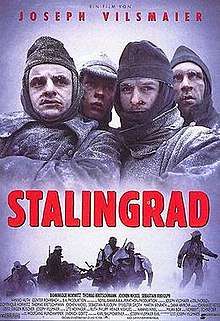Stalingrad (1993 film)
Stalingrad is a 1993 German war drama film directed by Joseph Vilsmaier. The movie follows a platoon of World War II German Army soldiers transferred to Russia, where they ultimately find themselves fighting in the Battle of Stalingrad.
| Stalingrad | |
|---|---|
 Theatrical release poster | |
| Directed by | Joseph Vilsmaier |
| Produced by | Hanno Huth Günter Rohrbach |
| Written by | Jürgen Büscher Johannes Heide |
| Starring |
|
| Music by | Norbert Jürgen Schneider Martin Grassl |
| Cinematography | Rolf Greim Klaus Moderegger Peter von Haller |
| Edited by | Hannes Nikel |
| Distributed by | Senator Film (Germany) Strand Releasing (USA) |
Release date |
|
Running time | 134 minutes[1] |
| Country | Germany |
| Language |
|
| Box office | $152,972 |
The film is the second German movie to portray the Battle of Stalingrad. It was predated by the 1959 Hunde, wollt ihr ewig leben (Stalingrad: Dogs, Do You Want to Live Forever?).
Plot
In August 1942, German soldiers enjoy leave in Cervo, Liguria, Italy after fighting in North Africa, where Unteroffizier Manfred "Rollo" Rohleder and Obergefreiter Fritz Reiser are both introduced to Leutnant Hans von Witzland, their new platoon commander. Their unit is promptly sent to the Eastern Front to participate in the Battle of Stalingrad.
Witzland's platoon joins a company commanded by Hauptmann Hermann Musk. Musk leads an assault on a factory, which results in heavy casualties and Witzland's platoon being surrounded in a decrepit building. During a Soviet attack, Witzland, Reiser, Rollo, Emigholtz, and "GeGe" Müller go down to secure the sewers. Witzland gets separated from the others and captures a Soviet soldier named Irina; she offers to lead him to safety, but instead pushes him into the water and escapes. His men rescue him, and Emigholtz is found severely wounded by an explosive trap; they take him to a crowded aid station, where Emigholtz dies. They are then arrested by Hauptmann Haller, who has previously clashed with Witzland regarding the treatment of Soviet POWs. They end up in a penal battalion disarming land mines.
Four weeks later, a brutal winter has set in and the Soviets have surrounded the German Sixth Army. Hauptmann Musk thus reassigns the penal battalion—which includes disgraced fellow officer Otto—to combat duty. Witzland's platoon defends a position from a Soviet tank column, and emerge victorious after a bloody battle. Hauptman Haller later orders von Witzland and his men to execute some unarmed civilians, much to their reluctance.
Witzland, GeGe, and Reiser decide to desert and head towards Pitomnik Airfield in hopes of catching a plane back to Germany, stealing medical tags from some dead bodies along the way to feign being wounded. By the time they arrive, the last transport leaves without them as the base is shelled by Soviet artillery. They rejoin the others in the shelter, where they find Musk suffering from severe trench foot. While the men recover a German supply drop, Haller appears and holds them at gunpoint, but is quickly subdued; he accidentally shoots GeGe as he falls, killing him. Haller then pleads for his life, telling them about the supplies he is hoarding in a nearby house before being executed by Otto.
In the house's cellar they find shelves stocked full of food and liquor, and Irina tied to a bed. Witzland cuts Irina free; she fears she will be considered a German collaborator, and both bond in their despair and disillusionment. As the rest of the men gorge themselves, a deluded and dying Musk tries to rally them to rejoin the fighting. Otto becomes hysterical and commits suicide. Rollo, the only one to obey the order, is last seen carrying Musk's corpse outside, only to find the Sixth Army surrendering to the Soviets.
Irina offers to help Witzland and Reiser avoid capture, but while trudging through the snow they are shot at by the Soviets; Irina is killed and Witzland is mortally wounded. The Germans get away, but Witzland eventually becomes too weak and dies in Reiser's arms. Reiser cradles his body, reflecting on his time spent in North Africa before freezing to death.
Cast
- Dominique Horwitz as Obergefreiter Fritz Reiser
- Thomas Kretschmann as Leutnant Hans von Witzland
- Jochen Nickel as Unteroffizier Manfred "Rollo" Rohleder
- Sebastian Rudolph as GeGe Müller (nicknamed GeGe to distinguish him from other Müllers)
- Dana Vávrová as Irina
- Martin Benrath as General Hentz (based on Generaloberst Walter Heitz)
- Sylvester Groth as Otto
- Karel Heřmánek as Hauptmann Hermann Musk
- Heinz Emigholz as Edgar Emigholz
- Ferdinand Schuster as Double Edgar
- Oliver Broumis as HGM (Müller)
- Dieter Okras as Hauptmann Haller
- Zdenek Vencl as Wölk
- Mark Kuhn as Feldwebel Pflüger
- Thorsten Bolloff as Feldmann
- Alexander Wachholz as Pfarrer Renner
- J. Alfred Mehnert as Lupo
- Ulrike Arnold as Viola
- Christian Knoepfle as Dieter
- Flip Cap as Ludwig
- Jaroslav Tomsa as Opa Erwin (Grandpa Erwin)
- Pavel Mang as Kolja
- Otto Sevcík as Major Kock (as Oto Sevcik)
- Jophi Ries as Schröder
Production
The film was shot in several locations, including Finland, Italy, and Czechoslovakia, and took much effort to make. Director Joseph Vilsmaier had a German military consultant with him on set. A series entitled "The making of Stalingrad" was released, giving a behind-the-scenes look at the film.
Reception
In 1993 the film won Bavarian Film Awards for Best Cinematography, Best Editing and Best Production.[2] It was also entered into the 18th Moscow International Film Festival.[3]
References
- "Stalingrad (1993)". IMDb. Retrieved January 12, 2016.
- IMDb Entry for Stalingrad
- "18th Moscow International Film Festival (1993)". MIFF. Archived from the original on 2014-04-03. Retrieved 2013-03-10.
External links
- Stalingrad on IMDb
- Stalingrad at AllMovie
- Stalingrad at Reelviews.net (James Berardinelli)
- Stalingrad at Rotten Tomatoes